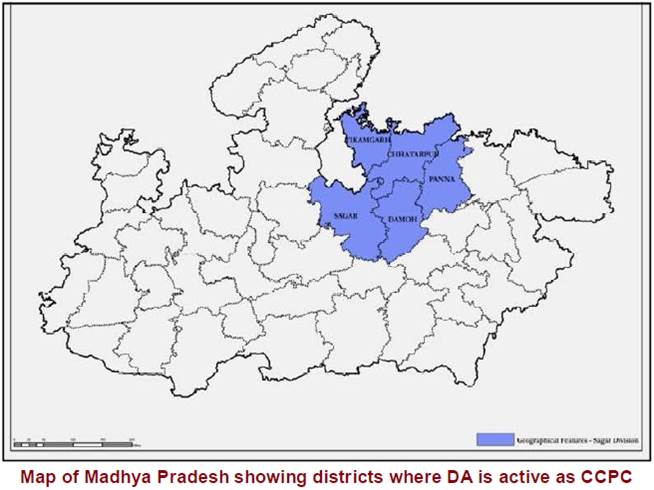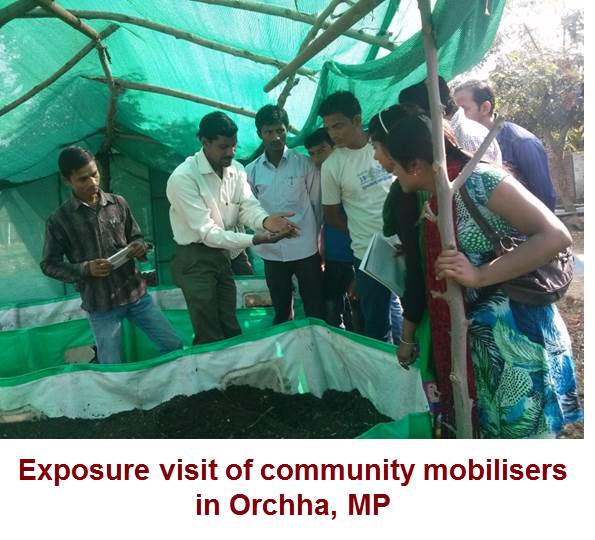|
Walking the Talk:
Operationalisation Climate change is a serious threat confronting the world today and uncertainties associated with climate variability pose great risks to development in India. An important way to deal with climate change is to mainstream it into decision making processes and increase the political discourse on climate change. To ensure that decision making then leads to better on ground implementation, there exists the need for better communication and information transfer between national, state and local levels. It is known that there are means and capacities for
mainstreaming climate change into decision making processes at the
national and state level. However, since implementation of climate
resilient measures happens at a much more local level, it is important
to build capacities at the local level too1.
The National Mission on Strategic Knowledge for Climate Change provides
the overall direction and seeks to build a knowledge system that would
inform and support national action. The State Action Plans on Climate
Change (SAPCCs) hold the potential as important interventions in the
development process. While 22+ states have created their SAPCCs, a few
have created draft reports and fewer still have been endorsed by the
Ministry of Environment, For While operationalising climate change concerns into decision making processes, different states have used different methods. For instance, there is a strong role that science and research have played in the climate plans of Karnataka and Madhya Pradesh. Both the states have been successful in drawing on science and research outcomes specific to the states by doing scientific assessments of the climate implications and then recommending action on cropping patterns, water stress etc3. The Government of Madhya Pradesh in fact has
successfully operationalised mainstreaming through its bodies for
institutional strengthening. The State Knowledge Management Centre for
Climate Change (SKMCCC) has been set up by the Environmental Planning
and Coordination Organisation (EPCO) to cater to the information needs
of the various stakeholders i.e. policy makers, scientific and academic
community and general public on climate change issues. Climate Change
Pulse Centres (CCPCs) as innovated and implemented by the Government of
Madhya Pradesh, through EPCO, are another institutional strengthening
body designated for mainstreaming of climate change d The CCPCs form the interface between government officials and village level change makers. Policies are enacted at the ground level through the trained community mobilisers and their adaptive capacities are built through exposure visits to introduce various community based adaptation models. Thus, a proper practice-to-policy connect has been established which has provided the platform for a two-way knowledge transfer between the grassroots and the state government. As is the case with any adaptation and mitigation plan, tight involvement of the communities in all decision making processes is of utmost importance. Implementation and operationalisation of the climate plan is a crucial success condition to achieve the larger goal of climate mainstreaming. q Rowena Mathew Endnotes 1 Ahmad, Imran Habib. 2009. "Climate Policy Integration: Towards Operationalisation". Economic and Social Affairs. UNDESA. 2 Dubash,Navroz K. and Jogesh,Anu. 2014. "From Margins to Mainstream: Climate Change Planning in India as a ‘Door Opener’ to a Sustainable future," Centre for Policy Research (CPR), Climate Initiative. 3 Development Alternatives. 2014. Climate Change Adaptation and Vulnerability Assessment Report.
|
 ests and Climate Change eg. Madhya Pradesh,
Sikkim, Himachal Pradesh, Karnataka and Odisha2.
ests and Climate Change eg. Madhya Pradesh,
Sikkim, Himachal Pradesh, Karnataka and Odisha2.
 iscussions into
decision making. The community-based Climate Change Pulse Centres
(CCPCs) have been set up in 11 Agro Climatic Zones of the state.
Development Alternatives has been designated as one CCPC responsible for
3 Agro-Climatic Zones (Vindhyan, Kaimur and Bundelkhand) in five
districts of Madhya Pradesh i.e. Sagar, Damoh, Panna, Chhatarpur and
Tikamgarh.
iscussions into
decision making. The community-based Climate Change Pulse Centres
(CCPCs) have been set up in 11 Agro Climatic Zones of the state.
Development Alternatives has been designated as one CCPC responsible for
3 Agro-Climatic Zones (Vindhyan, Kaimur and Bundelkhand) in five
districts of Madhya Pradesh i.e. Sagar, Damoh, Panna, Chhatarpur and
Tikamgarh.